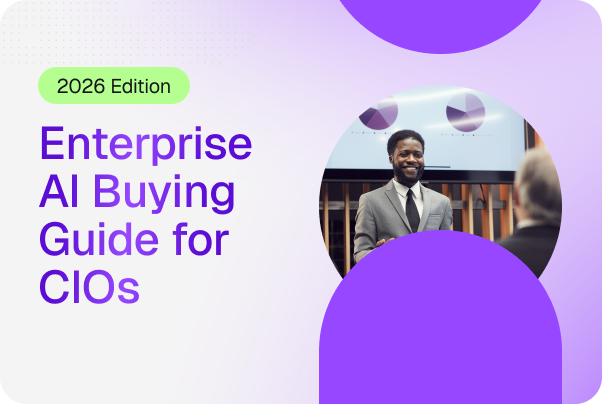Cognigy is a known enterprise tool to handle complex chats for big companies, especially in Europe. But how customers want to talk to businesses is changing fast. Voice calls are becoming key and more than 3,500 consumers across all ages say that a live phone call is their most preferred method of contacting companies.

Can platforms built mainly for chatbots keep up?
Often, the answer is no. Tools like Cognigy.ai, designed for text, can be slow and clunky for real-time voice calls. Modern voice AI needs speed (answers under half a second), easy ways to test changes quickly, and smooth performance. This article looks at the best Cognigy alternatives built specifically for the demands of voice AI in 2025.
Why Look Beyond Cognigy?
Cognigy works well for planned text chats. But when companies focus on voice, they often hit problems. Why? Because customer needs have shifted, and tools designed for text struggle with real-time voice demands. Here are the key issues:
- Voice Isn't Built-In: Cognigy was not designed for voice, it added it only later as a third-party integration. This means slower performance and less flexibility compared to voice-first platforms.
- Slow Voice Response: Waiting almost a second (700–900ms) for the AI to respond feels unnatural. This leads to awkward pauses and people talking over the bot, leading to an overall poor customer experience.
- Rigid Voice Conversations: Cognify voice conversations rely on NLP classification and intent routing, an older model of figuring out what people mean. This means their voice agents have limited adaptability to nuanced, real-world conversations.
- Long Setup Time: Getting voice working on Cognigy can take months (2–3+), including setup, connections, and testing. Businesses need faster AI solutions.
- Difficult AI Tuning: Quickly improving how the voice AI talks is hard. Cognigy's tools weren't made for the fast testing needed for voice prompts.
- Rising Costs: Using Cognigy for voice adds up. There are license fees, connection costs, and maybe expert help. The total cost can become very high.
Simply put, while Cognigy handles live chats, it’s not optimized or built for real-time voice AI. Businesses needing fast, clear voice calls (like in finance, healthcare, or logistics) find that voice-first platforms work better.
What to Look for in a Cognigy Alternative
As voice becomes more central to customer service automation, you want a tool that are fast, supports numerous concurrent calls, has transparent pricing, and more. When choosing a voice AI tool to replace or supplement Cognigy, what really matters? Focus on features critical for real-time voice performance and easy scaling:
1. Real-Time Speed
Is the response under half a second (sub-500ms)? Anything slower leads to awkward pauses and frustrated customers, completely breaking the flow of a natural conversation. This sub-second speed is the benchmark for making voice AI feel truly interactive, unlike the noticeable delays common with platforms not built specifically for voice.
2. Clear Pricing
Can you easily understand the costs? Look for simple, usage-based pricing (per minute/call) with public rates, which makes it much easier to predict expenses and scale operations without surprise charges. Avoid complex enterprise quotes that hide the true cost of voice calls and make budgeting difficult.
3. Fast Setup
Can you get a voice pilot running in weeks, not months? Modern voice platforms should allow quick deployment (under four weeks) using easy visual builders made for voice. This rapid setup means faster time-to-value compared to lengthy integration projects that delay results.
4. Smart Conversation Handling (Using LLMs)
Does it use modern AI (like GPT-4) for conversations? This allows for more natural, flexible dialogues that can understand context and handle unexpected turns, unlike older, rigid systems that struggle with the nuances of real customer interactions. LLM-powered agents adapt better to how people actually talk.
5. Voice Style Flexibility
Can you make the voice sound like your brand? Look for easy voice cloning, many languages/accents, and tone control – vital for voice-first customer experience. Maintaining brand consistency and offering personalized voice interactions builds trust and improves engagement over the phone.
6. Simple Phone Connection
Is connecting to phone lines easy? Look for built-in options (BYOC, SIP, Twilio) that avoid the complex, potentially costly add-ons or separate voice gateways needed by platforms not originally designed for voice. Direct integration simplifies the technical setup and reduces potential points of failure.
7. Built-in Quality Checks
Does it offer tools to analyze voice calls specifically? You need call recordings, automatic scoring, sentiment analysis, and detailed logs designed for voice to truly understand performance and identify areas for improvement. Standard chatbot analytics often miss crucial voice-specific details.
8. Enterprise Security & Compliance
Does it meet key AI security standards (SOC 2, HIPAA, GDPR, ISO 27001) out-of-the-box? Protecting sensitive voice data is critical, especially for industries like finance, healthcare, and any business handling personal customer information where compliance is non-negotiable.
Platform Reviews – Top 5 Cognigy Voice Alternatives
This section reviews tools offering alternatives to Cognigy, focusing on their strengths for real-time voice AI.
Synthflow

Synthflow is an accessible and powerful no-code ai voice agent platform designed for rapidly deploying high-performance voice AI agents. It tackles the common hurdles of voice AI implementation, which is long development times and the need for specialized skills to manage agents and campaigns. The no-fluff approach means faster results from the voice agents, like support success or lead qualification. It makes sophisticated, low-latency voice AI practical and scalable.
For example, healthcare provider Medbelle implemented Synthflow and improved their scheduling efficiency by 60%, got 2.5x more qualified appointments, and reduced no-show rates by 30%. Most importantly, patients were 25% more satisfied with the quicker response times from the voice AI.
Key Features
- No-Code Visual Builder for Voice: Allows technical and non-technical teams to build and manage complex voice agents much faster than typical low-code platforms, speeding up deployment.
- Real-Time Testing & Optimization: Enables quick refinement of voice AI responses directly in the platform, vital for quality conversations and overcoming slow tuning cycles.
- Rapid Deployment Framework: Designed to launch production voice agents in weeks, offering agility compared to the months often needed for adapting other systems for voice.
- Enterprise-Grade Security & Compliance: Meets key standards (SOC 2, HIPAA, GDPR, ISO 27001) for secure handling of voice data.
- Flexible Integration Capabilities: Connects easily to business systems via API, Zapier, Make.com, and standard telephony options (SIP, BYOC, Twilio).
Pros
- Achieve faster results in support automation and lead qualification due to rapid deployment capabilities.
- Empowers non-technical teams to build and manage voice agents, reducing reliance on specialized developers.
- Improves conversational quality through easy real-time testing and optimization.
- Ensures data protection and regulatory adherence with enterprise-grade security.
- Offers predictable voice AI costs and quicker time-to-value.
Cons
- Per-minute costs for very high usage may require moving to a personalized Enterprise plan for optimal cost-effectiveness.
Ideal Use Case
CX departments, innovation teams, and operations leaders in enterprises or fast-scaling B2Bs needing to quickly launch and iterate on high-impact voice automation for tasks like support, lead qualification, or appointment scheduling. Organizations prioritizing shorter development cycles, fast setup times, and predictable voice AI costs will find it a strong fit.
Why Choose Synthflow Over Cognigy?
The platform specifically overcomes Cognigy's major weaknesses for voice. Its sub-500ms speed eliminates the awkward delays common in Cognigy calls, making conversations feel natural. The easy no-code builder and real-time testing directly solve the difficulty and slowness of building and tuning voice agents on Cognigy's platform. Combined with faster deployment times and predictable pricing, Synthflow directly addresses the key frustrations users face when trying to use Cognigy for demanding real-time voice automation.
Poly AI

PolyAI specializes in enterprise voice assistants that handle natural, complex phone conversations exceptionally well, sounding very human. It targets high-call-volume businesses (banks, retail) aiming to automate many customer support calls. The platform allows customers to speak naturally, interrupt, or change topics without derailing the conversation.
Key Features
- Focus on "customer-led" conversations: Handles interruptions and topic changes expertly, allowing for more natural dialogue flow than many other systems.
- Proprietary spoken language technology: This technology is optimized specifically for voice interactions, combining retrieval and generative AI to understand and respond effectively.
- Proven success automating high volumes of voice calls: Demonstrates capability in enterprise contact centers by successfully handling a significant percentage of inquiries.
- Seamless integration with existing contact center tech: Works with current enterprise systems without requiring costly or time-consuming platform replacements.
- Emphasis on high-quality, natural-sounding voice synthesis: Prioritizes avoiding robotic interactions to enhance the user experience.
Pros
- Delivers exceptionally natural and fluid voice conversations, mimicking human interaction closely.
- Effectively automates a significant portion of calls in high-volume enterprise environments.
- Integrates smoothly with existing enterprise technology stacks, minimizing disruption.
- Provides high-quality, non-robotic voices that improve customer experience.
Cons
- Pricing is custom and likely expensive, targeting enterprise budgets, with no free plan for initial testing.
- Its strong focus on voice may mean less developed capabilities for text-based or omnichannel chat.
- There are relatively few public user reviews available, making it harder to gauge widespread sentiment.
Ideal Use Case
Large enterprises, particularly in high-call-volume sectors like banking, hospitality, insurance, and retail, where voice is the primary customer interaction channel. Organizations aiming to automate complex phone-based tasks such as reservations, order management, billing inquiries, and authentication while maintaining a premium, human-like experience.
Why Choose PolyAI Over Cognigy?
Choose PolyAI over Cognigy if the absolute top priority is the most natural, human-like voice conversation quality for phone calls. Its specialization in "customer-led" voice interactions and proven success in high-volume voice automation might be more compelling than Cognigy's broader, less voice-specialized approach, especially for overcoming the potential stiffness in Cognigy's voice flows.
Sierra AI

Sierra AI, founded in 2023, creates advanced, empathetic AI agents for enterprise customer service across channels. It focuses heavily on matching the AI's personality and voice to a company's brand, making it the ideal voice AI to use for high-end brands where perception and brand voice is key.
Key Features
- Strong emphasis on empathetic agents aligned with brand identity: Focuses on creating AI personas that deeply reflect a company's specific values and communication style.
- Unique "constellation" architecture using multiple LLMs for reliability: Employs several language models working together, supervised by another model, to enhance accuracy and reduce errors.
- Action-oriented agents executing tasks in integrated systems: Designed for agents to go beyond conversation and perform actions within CRMs, OMS, and other enterprise software.
- Innovative outcome-based pricing model (pay for results): Aligns costs with achieved business value, such as successful resolutions or completed tasks.
- Robust focus on enterprise security and data privacy: Implements stringent data governance, encryption, and masking of personal data.
Pros
- Delivers highly customized AI agents that embody a specific brand's voice and provide empathetic interactions.
- Its robust approach to security, privacy, and data governance is suitable for enterprise adoption.
- Agents can perform actions within integrated business systems (CRM, OMS), moving beyond simple Q&A.
- The multi-LLM architecture is designed for enhanced reliability and reducing errors.
Cons
- Being a relatively new platform (founded 2023), it may be less mature or feature-complete than more established players.
- Pricing is not publicly disclosed and is likely high, targeting large enterprise budgets.
- The outcome-based pricing, while innovative, could be complex to forecast or manage initially.
- Some users have reported a learning curve or occasional platform bugs.
Ideal Use Case
Large enterprise organizations, especially consumer-facing brands (e.g., Retail, E-commerce, Subscription Services) with significant customer service volumes that prioritize a premium brand experience. Automating complex, multi-turn customer service interactions where agents need to perform tasks like troubleshooting, managing accounts, or processing orders.
Why Choose Sierra AI Over Cognigy?
This is best for large companies (especially consumer brands) needing premium, custom AI agents that act like their brand, handle complex tasks, and integrate deeply with business systems. Sierra AI is better than Cognigy when it comes to empathetic customer experience.
Kore.ai

Kore.ai offers a large, comprehensive enterprise platform known as the Experience Optimization (XO) Platform, designed for building and managing digital assistants across both voice and digital channels. It stands out by using its own sophisticated language understanding technology combined with an accessible low-code builder. Supporting a wide range of channels and integrations, Kore.ai targets large companies looking for a robust, end-to-end solution.
Key Features
- Proprietary multi-pronged NLP engine: Combines fundamental meaning (deterministic) and machine learning (probabilistic) models for intent understanding.
- Extensive library of pre-built industry/functional virtual assistants: Offers templates for sectors like banking, retail, healthcare, and functions like HR and IT.
- Broad omnichannel support (45+ channels): Enables deployment across web chat, IVR, voice assistants, messaging apps, SMS, and email.
- Robust platform features for management, governance, and analytics: Includes tools for bot administration, RBAC, publishing workflows, and performance monitoring.
- Low-code/no-code visual builder and integration tools: Facilitates conversation design for both technical and business users, with an API framework for external system connections.
Pros
- Its multi-engine NLP approach enables accurate understanding and natural conversations.
- The visual builder is often praised for ease of use, making bot development accessible.
- Extensive omnichannel support and robust integration framework offer significant flexibility.
- Meets enterprise demands for scalability, security, analytics, and governance.
Cons
- Some users have encountered issues with the platform's automatic translation capabilities.
- A notable limitation is the difficulty or inability to easily revert to previous versions of a deployed bot.
- The platform's vast feature set could introduce complexity for users with simpler requirements.
- Session-based pricing model (15-minute increments) might not be ideal for very brief interactions.
- Certain advanced features (e.g., voice gateway, advanced RAG) are priced as add-ons.
Ideal Use Case
Large enterprises across various sectors (Banking, Insurance, Healthcare, Retail, etc.) requiring a powerful, scalable, and secure platform for automating complex customer service and employee self-service interactions across multiple voice and digital channels.
Why Choose Kore.ai Over Cognigy?
This platform is great for large companies needing a strong, scalable, secure platform for complex chatbots and voice assistants across many channels. Cognigy focuses more on mixing external AI models. Both are broad platforms, not solely focused on optimizing voice speed like some others.
Talkie.ai

Talkie.ai creates AI voice assistants specifically for the healthcare industry, automating calls for clinics and practices (scheduling, refills, FAQs). Because the AI handles these simple jobs, the front desk staff have less repetitive work and feel less stress. A key feature of Talkie.ai is the direct connection to major Electronic Health Record (EHR) systems (Epic, AthenaHealth).
Key Features
- Specialized focus exclusively on healthcare call workflows: Tailored for the unique needs and processes of medical front desks and clinics.
- Direct integration capabilities with major EHR systems: Connects with systems like Epic, AthenaHealth, eClinicalWorks, and Oracle Cerner.
- Designed to handle unlimited concurrent calls, 24/7: Ensures availability and scalability for busy healthcare providers.
- Automates core healthcare front desk tasks: Handles appointment scheduling/rescheduling, prescription refill requests, and answering clinic FAQs.
Pros
- Dedicated focus on healthcare provides highly relevant features like deep EHR integrations.
- Effectively addresses common pain points for clinics, such as high call volumes and staff workload.
- Operates 24/7 and can handle unlimited concurrent calls, improving patient access and reducing missed calls.
- Reduces patient wait times and alleviates staff burnout by automating routine tasks.
Cons
- Its narrow focus makes it unsuitable for businesses outside the healthcare vertical.
- Deployment time (2-4 months mentioned) might be slower than simpler, generic platforms.
- Limited public information on pricing structure and fewer independent user reviews compared to broader tools.
- Primarily focused on voice channel automation, potentially lacking broad omnichannel capabilities.
Ideal Use Case
Healthcare providers, including medical clinics, hospitals, and related call centers, that are struggling with high call volumes, long patient wait times, and staff burnout. Organizations requiring automation of routine patient-facing phone calls like appointment management and prescription refills, with deep integration into their existing EHR systems.
Why Choose Talkie.ai Over Cognigy?
Relevant for enterprise healthcare. Choose Talkie.ai over Cognigy if in healthcare and needing specific patient call automation with EHR links.
Synthflow vs Cognigy: Feature Comparison Table
If Cognigy is the enterprise tool for chatbots, then Synthflow is the dedicated platform for a powerful voice AI. The features are starkly different, almost opposites of each other.
The Best Alternative to Cognigy - Conclusion
While Cognigy is a capable platform for managing chatbots across different channels, it faces challenges when it comes to real-time voice calls. For companies needing fast, clear, and natural-sounding voice AI, platforms designed specifically for voice perform better.
Synthflow stands out as a strong alternative. Its pricing is transparent, it consistently responds in under half a second, and it offers an easy-to-use builder for creating and testing voice agents quickly. Furthermore, it meets high security standards (SOC 2, HIPAA, GDPR, ISO 27001), making it suitable for industries with strict requirements.
If your business aims to use effective voice AI agents that operate in real time, consider exploring solutions like Synthflow that are built from the ground up for voice communication.






